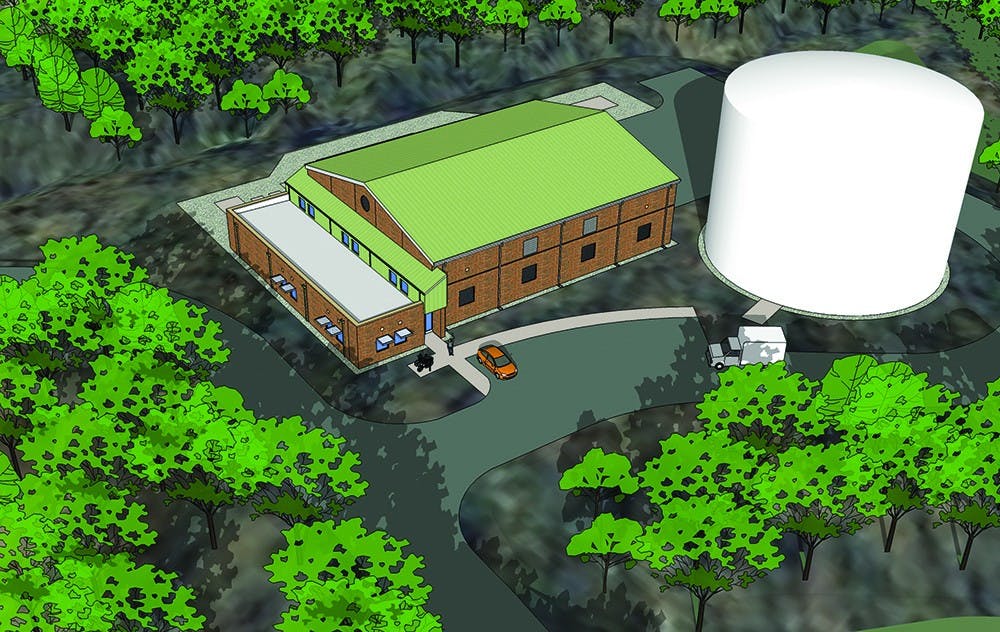Shippensburg University energy costs are predicted to plummet, while savings will rise, as construction has begun and is scheduled to take place over the coming months on a new campus-wide $30.2 million water chilling plant facility and revamped natural gas-powered heating system.
The project could save SU upward of $330,000 per year, and reduce its carbon footprint by 31 percent, according to the facilities management and planning department, which is working directly with the independent department of general services to oversee the project.
The pipes from the current steam system will remain in place, saving SU nearly $10 million in its installation of the natural gas system, which will replace the current coal-powered steam plant.
“They’ve been heating with steam for a long time,” said project manager Bruce Herring. “Steam leaves the coal plant, heats the buildings, turns to water and goes back to the plant.”
In that case, however, water often freezes, causing pipes to expand or burst. Herring said the new system will be much more reliable, and therefore cost effective.
“We are looking forward to not having to dig up the lines every year,” he said. “This minimizes the amount of heat being pulled through the ground.”
At least six jobs will be cut over the next few years, though Herring said the intention is for the individuals cut to remain within the system in a different capacity.
“We’re also trying to time it with individual retirements,” he said. “From a cost-saving standpoint, it will benefit us.”
The water chiller plant is going to be a completely new function, and its central facility will be constructed across from the Cora I. Grove Spiritual Center. This location was chosen because of its size. The facility will require a great deal of space to place all proper equipment.
Currently, workers are clearing trees and pathways, with the intention of leaving as many trees as possible. An access road will eventually lay behind a one-row perimeter of trees, enough to conceal the structure from anyone looking toward the forested area on the eastern side of campus.
Herring said “significant grade changes” will be made in order to create a level surface on which the plant will be set. Roadways will be crossed and blocked off during construction, though contractors will be required to maintain one-way access along Adams Drive.
The plant is expected to be complete by April 2015. After that, all campus buildings currently set up with centralized air conditioning systems will receive cool air from the plant.
“Basically, how it works is that big air compressor units that are chilling water in the plant are pumped throughout campus,” Herring said. “They are picked up by each building tied into the system, and the chilled water is distributed into the air.”
There will also be thermal storage units, which hold up to two million gallons of water that will be refrigerated overnight. During summer days, when SU is less populated, four-to-eight hours’ worth of water may be taken from the tanks to cool buildings in use.
Distribution for both the heating and cooling systems are drawn out into several neighborhoods based on the closeness of buildings and geography. The first four neighborhoods scheduled to receive maintenance in April and May 2014 are between the UPS Store and Ship Rec; between Grove Hall and Lehman Library; between Dauphin Humanities Center and Wright Hall and between Reed Operations Center and Kriner Hall.
At this point, dates have been pushed back about three weeks, meaning underground digging could affect campus roads and sidewalks into the fall 2014 semester. Contractors are working closely with campus officials on a weekly basis to coordinate traffic plans and road closures.
“Our primary concern is to keep classes going and keep people in their offices,” Herring said. “We will be putting information out on an ongoing basis. We’re emphasizing safety; we’ll keep the university running at 100 percent.”
Anyone with questions or concerns on the project is encouraged to call the Facilities Management and Planning Department at 717-477-1451.





The Slate welcomes thoughtful discussion on all of our stories, but please keep comments civil and on-topic. Read our full guidelines here.